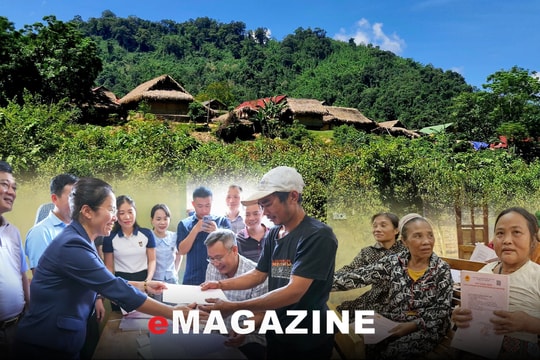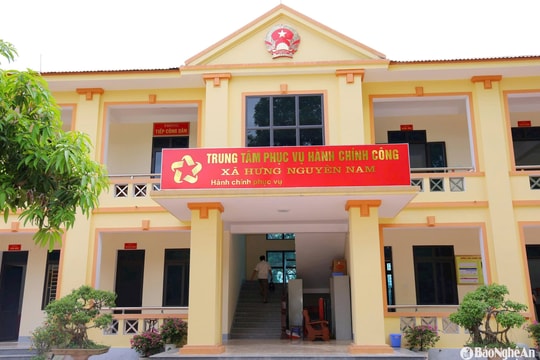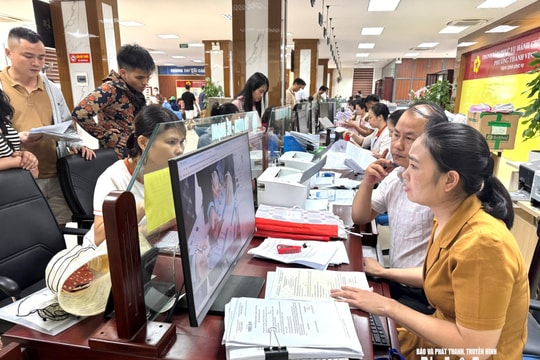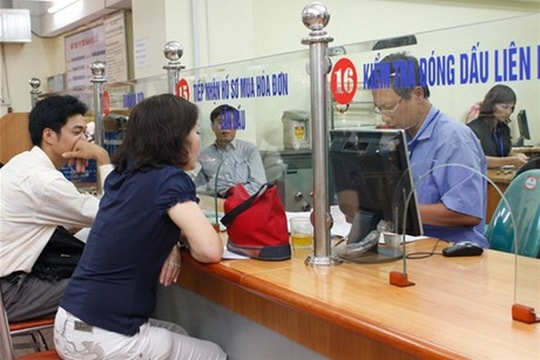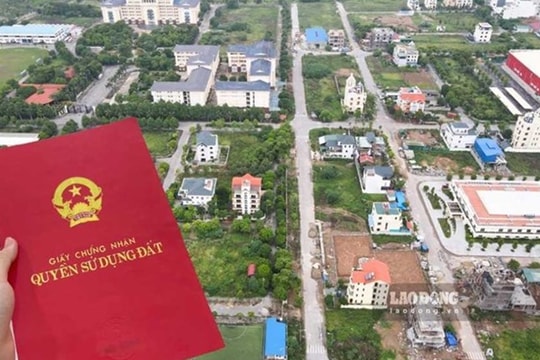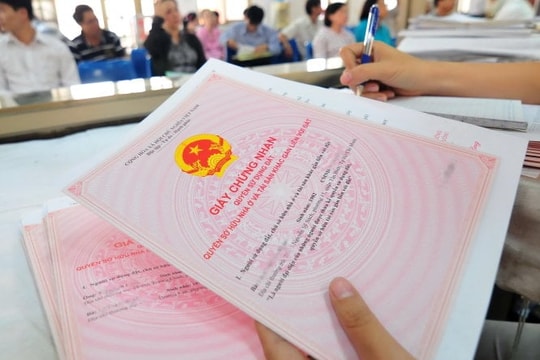Exemption from land use fees for meritorious people; Individuals are compensated when found not to be corrupt
These are the new policies among many that take effect from February 15, 2022.
New regulations on origin of goods
Effective from February 15, 2022, Decree 111/2021/ND-CP issued on December 9, 2021 amends and supplements a number of articles of Decree No. 43/2017/ND-CP dated April 14, 2017 of the Government on product labels.
In particular, Decree 111/2021/ND-CP amends and supplements Article 15 on origin of goods. Specifically, organizations and individuals producing, exporting, and importing goods must self-identify and record the origin of their goods to ensure honesty, accuracy, and compliance with legal regulations on origin of exported and imported goods, goods produced in Vietnam, or international commitments to which Vietnam is a party.
The origin of goods stated on the label is shown by one of the following phrases: “made in”; “manufactured in”; “country of manufacture”; “origin”; “manufactured by”; “product of” followed by the name of the country or territory where the goods are produced or stated according to the law on origin of goods.
 |
| Vinh Citadel seen from above. Photo courtesy of CTV |
In case the origin of goods cannot be determined according to the above regulations, the place where the final stage of completing the goods is recorded. Expressed by one of the following phrases or combinations of phrases showing the stage of completing the goods: "assembled at"; "bottled at"; "mixed at"; "finished at"; "packaged at"; "labeled at" with the name of the country or territory where the final stage of completing the goods is performed.
The name of the country or territory where the goods are produced or where the final stage of finishing the goods is carried out cannot be abbreviated.
Regulations on land use fee exemption for meritorious people
Effective from February 15, 2022, Decree 131/2021/ND-CP dated December 30, 2021 details and measures to implement the Ordinance on Incentives for People with Meritorious Services to the Revolution, which stipulates exemption of land use fees for people with meritorious services.
Specifically, land use fees within the land allocation limit are exempted when the State allocates residential land, changes the purpose of residential land use, recognizes the right to use residential land, and is allowed to buy State-owned houses for the following subjects: Revolutionary activists before January 1, 1945; Heroes of the People's Armed Forces, Heroes of Labor during the resistance war; Heroic Vietnamese Mothers;
War invalids, including category B war invalids recognized before December 31, 1993, people enjoying policies like war invalids, sick soldiers, resistance fighters infected with toxic chemicals with a body injury rate of 81% or more; relatives of martyrs receiving monthly survivor allowance.
Exemption from land use fees when purchasing a house (a multi-story house with many households) currently rented and owned by the State according to Decree No. 61/CP dated July 5, 1994 of the Government for revolutionary activists from January 1, 1945 to the August 1945 uprising.
Decree 131/2021/ND-CP also stipulates land use fee reduction for people with meritorious services.
Returned to work position after being found not guilty of corruption
According to Decree 134/2021/ND-CP issued on December 30, 2021, amending and supplementing a number of articles of Decree 59/2019/ND-CP dated July 1, 2019, detailing a number of articles and measures to implement the Law on Anti-Corruption, a person who is temporarily suspended from work or temporarily transferred to another job position may return to his/her original job position after the competent agency or organization concludes that he/she has not committed any acts of corruption.
Also according to Decree 134/2021/ND-CP, a particularly serious corruption case is a case in which the person committing the corruption is punished by imprisonment from over 15 years to 20 years, life imprisonment or death penalty (the old regulation is from over 5 years to 20 years, life imprisonment or death penalty).
Decree 134/2021/ND-CP takes effect from February 15, 2022.
Comprehensive and accurate assessment of continuing education students
Circular 43/2021/TT-BGDDT regulates the assessment of students studying the Continuing Education Program at junior high school and high school levels.
The Circular clearly states that the assessment requirements are to ensure accuracy, comprehensiveness, fairness, honesty and objectivity. Assessment is for the progress of students; emphasis is placed on motivating and encouraging students to make efforts in training and studying; students are not compared with each other.
Assessment forms include assessment by comments and assessment by scores.
Assessment by comments: Teachers use speaking or writing to comment on students' performance of training and learning tasks; comment on students' progress, outstanding strengths, and main limitations during the training and learning process; evaluate students' training and learning results.
Assessment by score: Used in regular assessment, periodic assessment through testing forms, assessment of training and learning tasks of students in accordance with the characteristics of the subject. Learning results by subject are assessed by scores on a 10-point scale, if using another scale, it must be converted to a 10-point scale.
The semester grade point average (GPA) is used to evaluate the learning outcomes of students in each semester, the yearly grade point average (Yearly GPA) is used to evaluate the learning outcomes of students in the entire school year. The learning outcomes of students in each semester and the entire school year are evaluated according to 01 of 04 levels: Good, Fair, Satisfactory, Unsatisfactory.
This Circular takes effect from February 14, 2022 and is implemented according to the following roadmap:
- From the 2021 - 2022 school year for grade 6.
- From the 2022 - 2023 school year for grades 7 and 10.
- From the 2023 - 2024 school year for grades 8 and 11.
- From the 2024 - 2025 school year for grades 9 and 12.
New regulations on granting and changing press cards
Circular No. 31/2021/TT-BTTTT details and provides guidance on records and procedures for granting, changing, re-granting and revoking press cards, effective from February 15, 2022, replacing Circular No. 49/2016/TT-BTTTT.
One of the most notable new points of Circular No. 31/2021/TT-BTTTT is the regulation that applicants for press cards must declare their Personal Identification Number (Form No. 01), instead of having to declare a number of information fields (hometown; current residence; ID card number/citizen identification card). However, at present, it is still necessary to temporarily declare information on date of birth and ethnicity (to serve the purpose of printing cards and determining the conditions of cardholders who are ethnic minorities) because the national population database is not yet completed and has not been shared.
List of periodically transferred job positions in the education sector
According to Circular 41/2021/TT-BGDĐT of the Ministry of Education and Training stipulating the list and period of periodic job transfer in agencies, organizations, units under and directly under the Ministry and under the management scope of the sector, field of education at local authorities, effective from February 14, 2022, job positions in consulting, organizing exam questions, organizing exams, selecting excellent students, recruiting high school, college in preschool education, university, master's, doctorate... are periodically transferred from 03 years to 05 years.
Health check for students at least once per school year
Circular 33/2021/TT-BYT of the Ministry of Education and Training regulating school health work in higher education institutions and vocational education institutions takes effect from February 15, 2022.
In particular, the Circular stipulates organizing health check-ups for students when they first enroll and periodically at least once a year in each school year. Monitoring and checking students' health, detecting health risk factors and diseases for prevention, treatment or referral for treatment according to the provisions of law.
Implementing hygiene measures to prevent and control epidemics in educational institutions. Consulting students on issues related to diseases, health risk factors, health promotion, proper nutrition, physical and mental development and physical activity. Instructing measures to ensure occupational safety and hygiene, and preventing accidents and injuries during learning and practice.
New regulations on forensic expertise in the construction sector
Effective from February 5, 2022, Circular 17/2021/TT-BXD of the Ministry of Construction stipulates a number of contents on judicial appraisal activities in the construction field, replacing Circular 04/2014/TT-BXD.
The Circular clearly states three contents of construction judicial appraisal, including:
1- Judicial appraisal of compliance with the provisions of law on construction planning, construction investment activities, housing and real estate business.
2- Judicial appraisal of construction quality, including: Appraisal of quality of construction survey, construction design, construction materials, components, construction products, construction equipment, construction parts, construction works; appraisal of causes of construction incidents, causes of damage to construction works.
3- Judicial appraisal of construction costs, including: appraisal of total investment, construction estimates, construction package prices; payment and settlement of construction contracts, payment and settlement of construction investment capital and other related issues; judicial appraisal of housing and real estate values.
4 forms of handling unsafe food after recall
Circular 17/2021/TT-BNNPTNT of the Ministry of Agriculture and Rural Development regulating the traceability, recall and handling of unsafe food under the management of the Ministry takes effect from February 2, 2022.
The Circular clearly stipulates four forms of handling unsafe food after recall, including:
1- Correcting product errors and labeling errors: Correcting product errors applies to cases where food can be processed using technical measures to ensure food safety; correcting labeling errors applies to cases where food is labeled incorrectly according to regulations.
2- Change of purpose of use: Applicable to cases where food is not safe, has negative effects on consumers' health, cannot be used as food but can be used for other purposes after appropriate treatment.
3- Re-export: Applicable to imported food that does not ensure safety and is subject to re-export according to legal regulations.
4- Destruction: Applicable to cases where food has safety limits that are not consistent with self-declared records, technical standards, and food safety regulations, affecting consumers' health and cannot be used for other purposes or re-exported.
Fee for appraisal of conditional business in the fisheries sector: 5.7 million VND/time
Circular No. 112/2021/TT-BTC of the Ministry of Finance stipulating the collection rates, collection, payment, management and use of fees in the field of aquaculture management takes effect from February 1, 2022. Accordingly, the fee for assessing conditional business in the field of aquaculture is 5.7 million VND/time.


